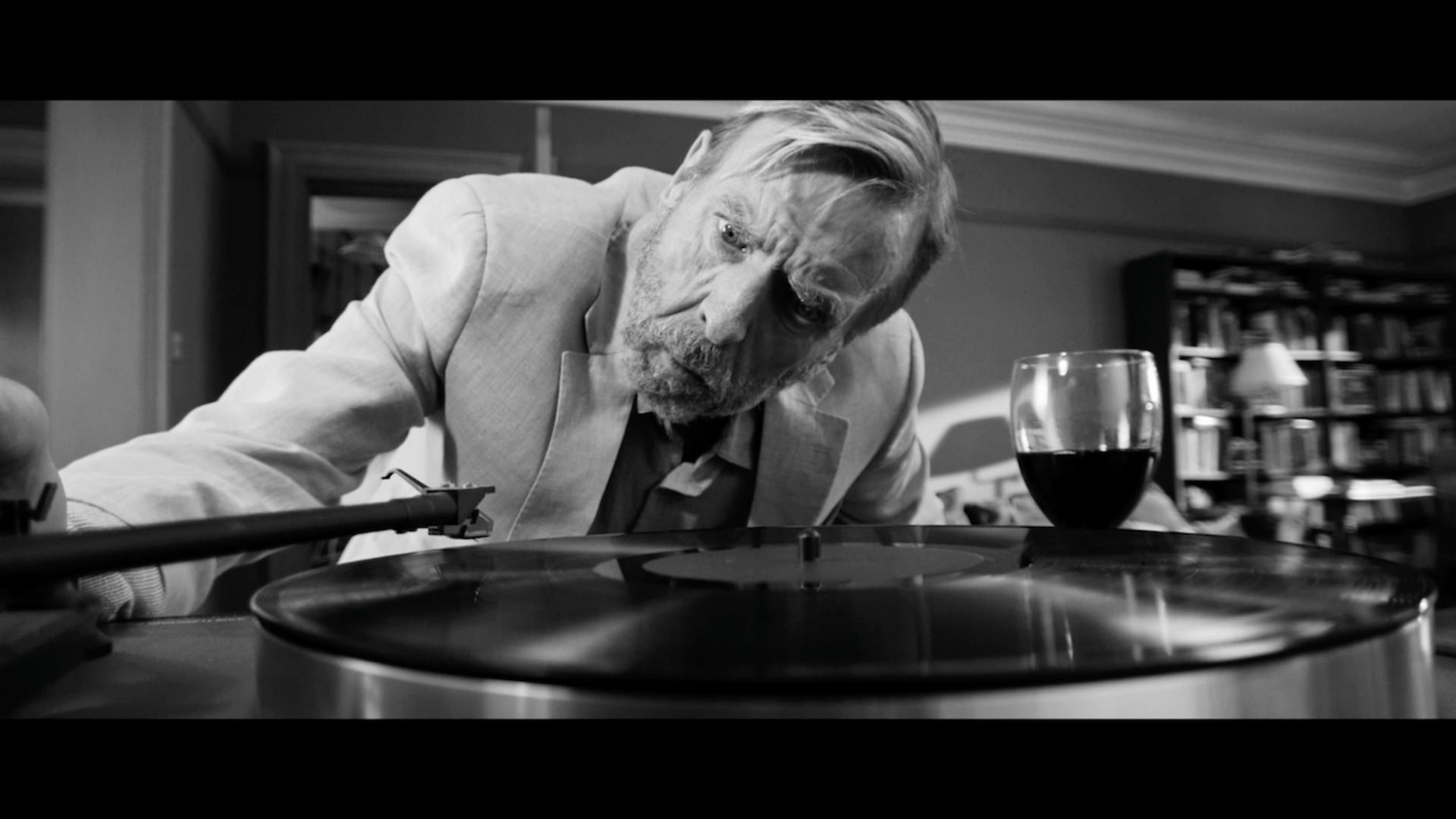The Party has been called cinema’s first reaction for Brexit. Beginning as a subtle and witty comedy, oozing with razor-sharp wit, the film later veers into tragedy. When life can no longer be controlled by reason, people will fight tooth and nail to protect their seemingly stable existence. For her eighth theatrical feature British director and screenwriter Sally Potter has invited a stellar cast to join her party. Among her stars both Kristin Scott Thomas and Timothy Spall shine bright. I had the chance to talk to them in Berlin, where The Party has its premiere at Berlinale.
Artur Zaborski: I was surprised how brisk the film was. Was this Sally Potter’s intention?
Kristen Scott Thomas: She said she was surprised by the energy the film created. The house became like a pressure cooker. Watching the film again last night was a fabulous experience because we never watched it with a big audience like that. The energy on-screen was surprising.
Zaborski: How fun was it to make The Party?
Timothy Spall: It was fun because you have such a pedigree of people. But it was also a massively tall order. Necessity is the mother of invention so it concentrates the mind wonderfully knowing you have this [short] time frame. Sally is brilliant at preparing you individually. We had four intense days to make everybody happy. Given that she is so “forensic” in how she writes, she was still open. She gave us the possibility of collaboration so that we were not dictated to. She gave us the window of opportunity, which created this amazing energy.
Zaborski: What happens at the party is a metaphor for the very unstable political situation in England. The future is unknown and connections have been severed.
Spall: It’s interesting what you are saying. These people [in the film] live in an intellectual surety, an intellectual moral high ground to a certain degree. They don’t feel more superior to anyone else but they feel they have the answer to how to make the world a better place for everybody. And the series of revelations that they go through destroys this structure so quickly and so easily that what it is is representative of what is happening to the broad intellectual liberal left. It’s flying about, it doesn’t know what to do in response to what’s happening as the right, the new right, the alt-right, or whatever you call the populist movement, is seeming to carry the argument. And the left with all its reasonableness, the ability to judge and be careful about everybody being okay is portrayed at this party. The intellect starts to devour itself. They are eating themselves with their own passions.
Zaborski: Were you into politics when you were younger?
Spall: I was this kind of a student protesting against everything. I didn’t care what it was about, I just went along with it to have a good time.
Scott Thomas: In France, we have marches all the time. I love it, it’s very healthy. Demonstrating is a very healthy thing. I went to a march in 2002 when there were the general elections and the far-right Front National was threatening. I also went on a women’s march but that’s as political as I get.
Zaborski: It’s getting more and more frustrating to demonstrate. I lost faith in demonstrating as a tool for getting things done.
Scott Thomas: I have the same problem as you. It’s hard so it’s great to be involved in a project like this, which brings up the subject and brings it to a different perspective. The subject of What is right or wrong? Who is right or wrong? Who’s saying the truth? What is the truth? This film creates a conversation and that’s always a useful thing.
Zaborski: Did you shoot in sequence? Because the energy changes throughout the film. Did it also change onset between you?
Scott Thomas: It’s funny because in the beginning there are these long scenes where we are all together in the same room. And then everyone disappears into their own private conversations. The girls go into the garden, while Cillian’s character is zooming around, he’s buzzing like a fly, and April and I go into the bathroom for our own tête-à-tête.
Spall: There are massive conflicting energies all over the place. And it’s a beautiful thing that they come together in this shared bourgeois experience, the gentle celebration of this seemingly positive thing. And it ends up in a massive post-apocalyptic fight. And what makes it so funny is that these people are so sure of themselves because they have a particular way of encapsulating their thoughts. Once this smugness or confidence is broken, it disjoints them and their passions come out. And it’s like looking at a beautiful statue or gown that turns into a beast. All of a sudden it becomes carnal, it becomes about feeling, resentment. My character is just riddled with this nuclear resentment, this nuclear sacrifice. The lid comes off because it becomes solipsistic. It’s about: “What about me?” And it’s about him because he’s dying. All these bizarre things are pressed out, kept under this very powerful lid of intellect and “the proper way to behave .” And once this lid comes off, it’s Pandora’s box. Chaos is coming—chaos in the big sense, the one before the universe was born.
Zaborski: Kristin, you’ve decided to become a director yourself…
Scott Thomas: …did the word “chaos” make you think of that?
Zaborski: (Laughs) No, no. Do you get inspiration from directors you work with?
Scott Thomas: I was looking over Sally’s shoulder quite a lot. I was constantly asking her: “Why do you do that? Why are you writing this down?” etc.
Zaborski: After your directorial debut are you planning to act more to focus on directing?
Scott Thomas: I wanted to make this film [The Sea Change] because it’s been in my head a long time now. But a lot of actors make films. It’s not a new thing, it’s a natural progression. I made an awful lot of films and I feel I need to tell a story from a wider angle.
Zaborski: There’s an ongoing discussion about gender pay equality and basic equality. Are you a part of it?
Scott Thomas: Absolutely. You’ve got me heated now. There’s a movement in Paris called “52” because 52 per cent of the population in France is female and therefore they are the buying power. And yet we don’t earn the same amount, we earn less. From November 7, French women essentially work “for free” for the rest of the year. It’s insane.
Zaborski: Do you think art should make political comments? Very often we try to find a political context in a film that doesn’t have one. Should actors be open about their feelings and share their opinions on political issues?
Spall: I don’t think I’ve ever made any proclamations. That’s not my job. It appears to me that when politics are no longer trusted, people often turn back to art. And artists are often tapping into things, consciously or unconsciously. I think the best part is left-wing, but some art is fascist. There’s been this discussion about Wagner. It didn’t make him any less brilliant and some people asked: “Where is this coming from?” Not all art is benign or left-wing: It’s quite vile. But, in general, art taps into something or predicts something unconsciously or through feeling.
Scott Thomas: Sometimes we’re able to do something that will be relevant and help people understand a situation or an emotion. I did a film called Sarah’s Key, which is fantastically useful and is shown at schools all over the world to talk about the Holocaust. I’m really pleased I was able to do that. But that’s it. I don’t take myself too seriously as a mouthpiece for any particular cause. I’m fascinated and concerned by the women’s movement. I would never want to make pronouncements because I don’t know anything, I just have an instinct. You think you know something because you read one newspaper, and then you read another newspaper. I’ve got two completely opposite newspapers in my iPad. One is quite right-wing, and the other is left-wing. I was reading The Guardian avidly like a madwoman. And suddenly I thought, “My God, I just can’t cope. It’s all too awful. Find me one that’s happy.” So I read a newspaper with a completely different point of view, where I read everything’s not really that bad. It’s not my place to talk about things I know nothing about. All I can do is interpret and put across things that have to do with people. That’s as far as I can go.
Zaborski: For Kristin, Many young actors and actresses, when asked about mentors, mention you. Does being in this position make you more careful about what you say or do? Do you think you left your mark in the history of cinema?
Scott Thomas: It’s nice to think I might have. But it’s absolutely terrifying to think that somebody’s trying to emulate what I do. Terrible responsibility. I try not to look down; I prefer to look up. I try not to look at the people that come behind me. I keep going furiously until I drop dead. They’ll all catch up.
Read the interview and want more? Check out our Gush on Patricia Clarkson, who co-starred in The Party.






